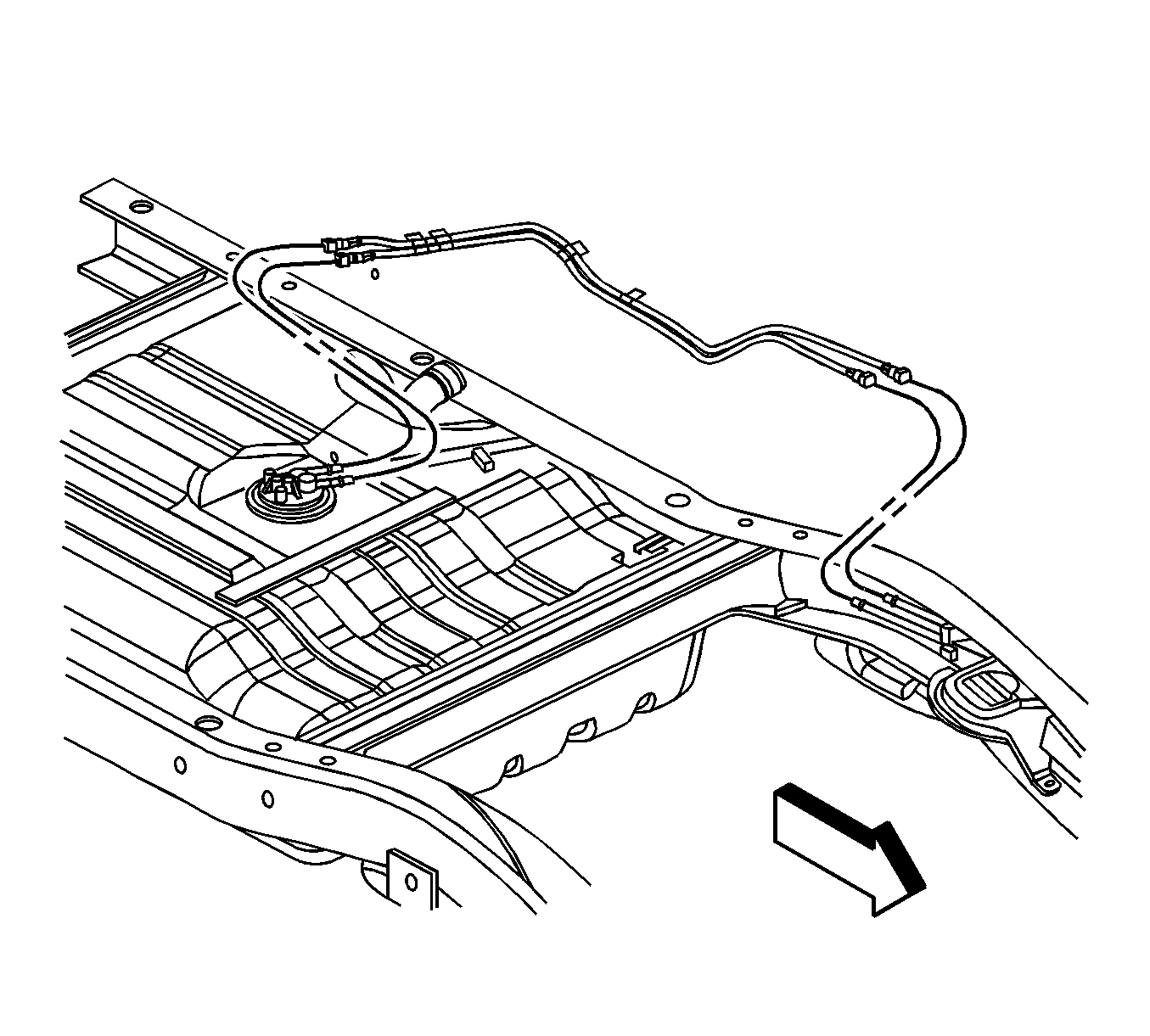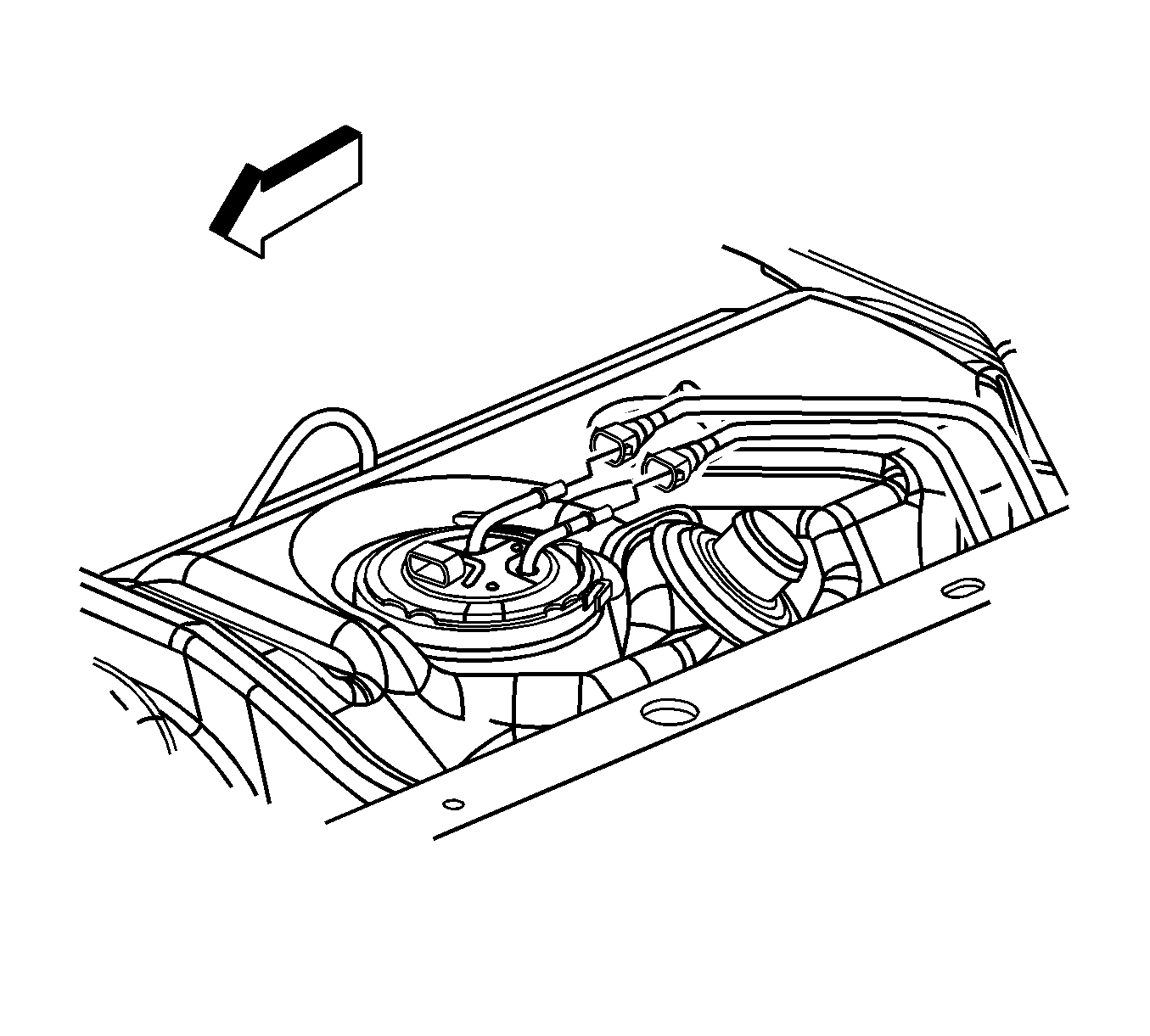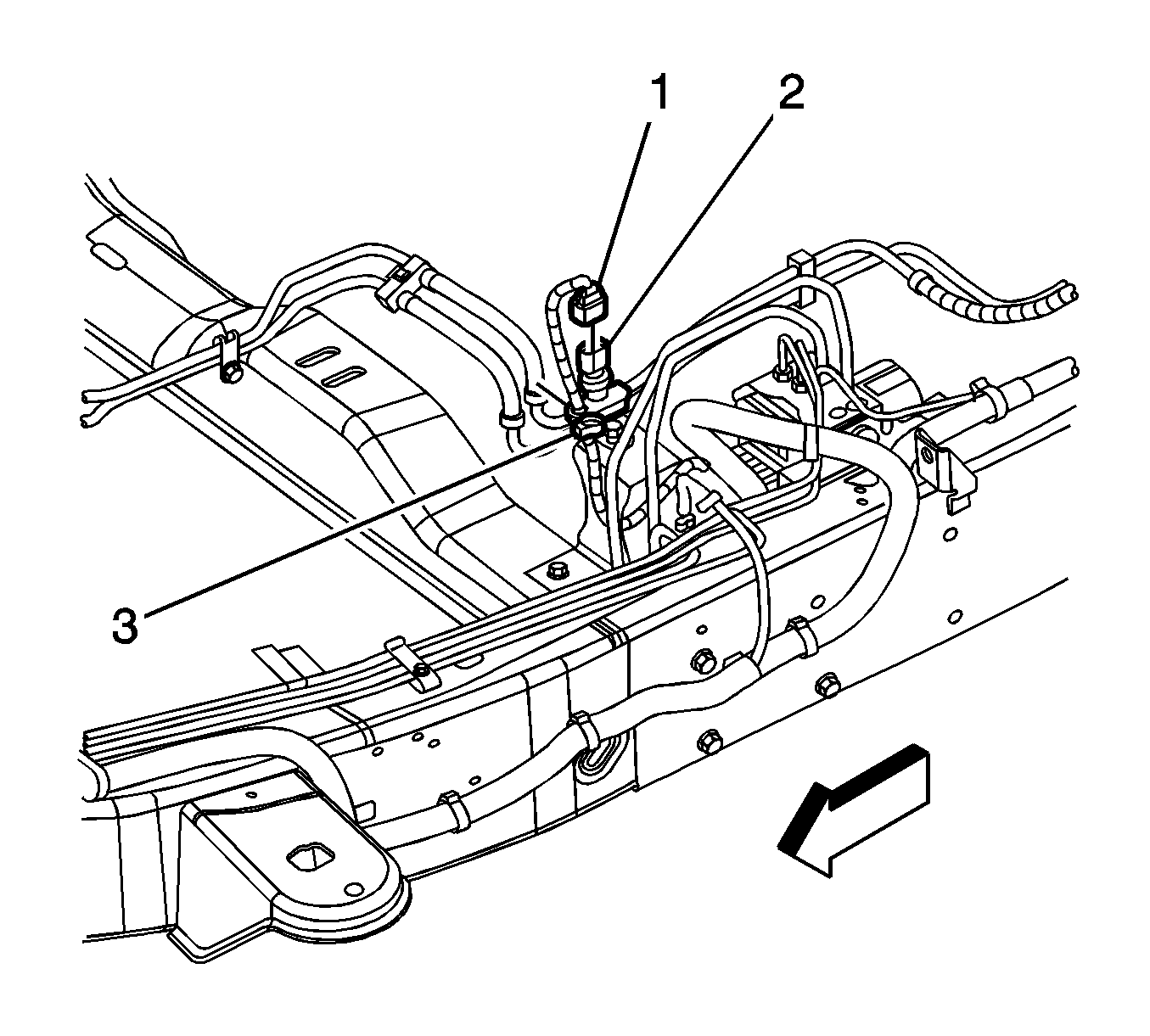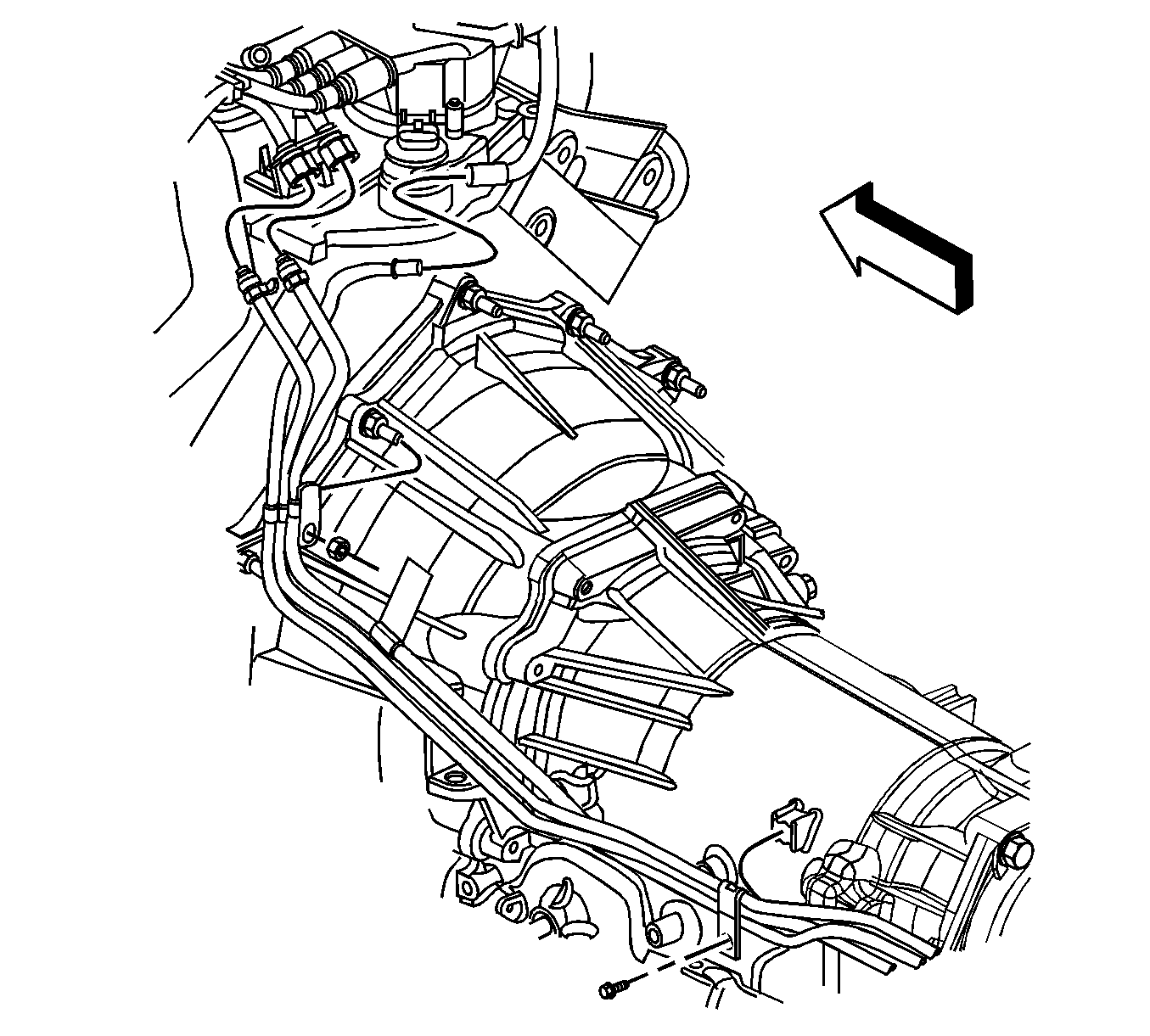Fuel Hose/Pipes Replacement - Chassis Cutaway Van - Rear Tank
Removal Procedure
Caution: Unless directed otherwise, the ignition and start switch must be in the OFF or LOCK position, and all electrical loads must be OFF before servicing
any electrical component. Disconnect the negative battery cable to prevent an electrical spark should a tool or equipment come in contact with an exposed electrical terminal. Failure to follow these precautions may result in personal injury and/or damage to
the vehicle or its components.
- Disconnect the negative battery cable.
- Relieve the fuel system pressure. Refer to
Fuel Pressure Relief
.
- Drain the fuel tank. Refer to
Fuel Tank Draining
.
- Raise the vehicle. Refer to
Lifting and Jacking the Vehicle
.

- Disconnect the fuel feed pipe at the fuel filter.
- Disconnect the chassis fuel return pipe at the rear fuel return pipe.
- Disconnect the chassis fuel feed and return pipes at the rear fuel feed and return pipes.
- Remove the fuel pipe retaining clips.
- Remove the fuel feed and return pipes.
Installation Procedure
Notice: Refer to Fastener Notice in the Preface section.
- Install the fuel feed and return pipes and the fuel pipe retaining clips (2) to the frame rail (1).
Tighten
Tighten the bolts to 12 N·m (106 lb in).
- Connect the chassis fuel feed and return pipes to the rear fuel feed and return pipes (2).

- Connect the chassis fuel return pipe to the rear fuel return pipe.
- Connect the fuel feed pipe to the fuel filter.
- Lower the vehicle.
- Refill the fuel tank.
- Tighten the fuel filler cap.
- Connect the negative battery cable.
- Inspect for leaks:
| 9.1. | Turn ON the ignition for 2 seconds. |
| 9.2. | Turn OFF the ignition for 10 seconds. |
| 9.3. | Turn ON the ignition switch. |
| 9.4. | Inspect for fuel leaks. |
- Install the engine cover. Refer to
Engine Cover Replacement
.
Fuel Hose/Pipes Replacement - Chassis Cutaway Van - Side Tank
Removal Procedure
Caution: Unless directed otherwise, the ignition and start switch must be in the OFF or LOCK position, and all electrical loads must be OFF before servicing
any electrical component. Disconnect the negative battery cable to prevent an electrical spark should a tool or equipment come in contact with an exposed electrical terminal. Failure to follow these precautions may result in personal injury and/or damage to
the vehicle or its components.
- Disconnect the negative battery cable.
- Relieve the fuel system pressure. Refer to
Fuel Pressure Relief
.
- Drain the fuel tank. Refer to
Fuel Tank Draining
.
- Remove the fuel tank. Refer to
Fuel Tank Replacement
.

- Disconnect the fuel feed pipe at the fuel filter.
- Disconnect the chassis fuel return pipe at the rear fuel return pipe.
- Remove the fuel pipe retaining clips.
- Remove the fuel feed and return pipes.
Installation Procedure
Notice: Refer to Fastener Notice in the Preface section.
- Install the fuel feed and return pipes and the fuel pipe retaining clips (1).
Tighten
Tighten the bolts to 12 N·m (106 lb in).
- Connect the chassis fuel return pipe to the rear fuel return pipe.

- Connect the fuel feed pipe to the fuel filter.
- Install the fuel tank. Refer to
Fuel Tank Replacement
.
- Lower the vehicle.
- Refill the fuel tank.
- Tighten the fuel filler cap.
- Connect the negative battery cable.
- Inspect for leaks:
| 9.1. | Turn ON the ignition for 2 seconds. |
| 9.2. | Turn OFF the ignition for 10 seconds. |
| 9.3. | Turn ON the ignition. |
| 9.4. | Inspect for fuel leaks. |
- Install the engine cover. Refer to
Engine Cover Replacement
.
Fuel Hose/Pipes Replacement - Chassis Cargo/Passenger Van
Removal Procedure

- Disconnect the negative battery cable. Refer to
Battery Negative Cable Disconnection and Connection
.
- Relieve the fuel system pressure. Refer to
Fuel Pressure Relief
.
- Disconnect the fuel feed and evaporative emission (EVAP) pipes from the engine compartment fuel pipes.
- Disconnect the chassis wiring harness electrical connector (1) from the fuel pressure sensor (2).
- Remove the chassis wiring harness clip (3) from the fuel pipe.

- Remove the fuel pipes from the bellhousing stud retainer clip.
- Raise the vehicle. Refer to
Lifting and Jacking the Vehicle
.
- Disconnect the fuel feed pipe at the fuel tank.
- Disconnect the chassis EVAP pipe from the fuel tank.
- Remove the fuel pipe retaining clips. Note the location of the retaining clips for installation.
- Remove the fuel feed and EVAP pipes.
Installation Procedure

- Position the fuel feed and EVAP pipes in the vehicle.
Notice: Refer to Fastener Notice in the Preface section.
- Install the fuel pipe retaining clips.
Tighten
Tighten the clips to 12 N·m (106 lb in).
- Connect the chassis EVAP pipe to the fuel tank EVAP pipe.
- Connect the fuel feed pipe to the fuel tank pipe.

- Connect the chassis wiring harness electrical connector (1) to the fuel pressure sensor (2).
- Install the chassis wiring harness clip (3) to the fuel pipe.
- Lower the vehicle.
- Install the fuel feed and EVAP pipes to the engine compartment fuel pipes.
- Install the fuel pipes to the retainer clip.
Tighten
Tighten the nut to 28 N·m (21 lb ft).
- Tighten the fuel filler cap.
- Connect the negative battery cable.
Battery Negative Cable Disconnection and Connection
.
- Inspect for leaks:
| 12.1. | Turn ON the ignition for 2 seconds. |
| 12.2. | Turn OFF the ignition for 10 seconds. |
| 12.3. | Turn ON the ignition. |
| 12.4. | Inspect for fuel leaks. |
- Install the engine cover. Refer to
Engine Cover Replacement
.








